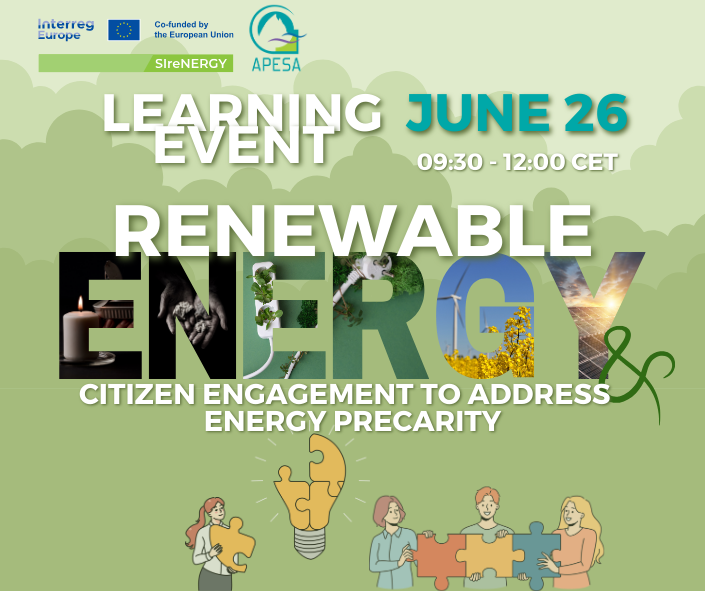Renewables and citizen engagement to address energy poverty

The second SIreNERGY learning event, held on June 26, 2024, brought together researchers and around 40 participants to address energy precarity through citizen engagement and renewable energy projects. Organized by APESA in collaboration with Leartibai Fundazioa, this event focused on exploring energy precarity and equitable access to sustainable energy.
The event began with presentations on two EU Interreg projects: SCEPA and POWERTY, both aimed at addressing energy poverty and promoting fair energy transitions. SCEPA, presented by Thijn de Voogd, seeks to empower vulnerable households through local pilot projects, awareness campaigns, energy communities, and energy-saving measures, supported by a data platform for knowledge sharing. María Luisa Borra then introduced the POWERTY project, which integrates renewable energy solutions for vulnerable groups, including innovative strategies like installing solar panels on public school roofs in Torreblanca, Spain. Both projects emphasize the importance of community engagement, better policies, and renewable energy, demonstrating how targeted actions can support sustainable energy transitions across Europe.
The second part of the event featured an academic session with Dr. Lise Desvallees, Dr. Nives Della Valle, and Professor Stefan Bouzarovski. They discussed the socio-political challenges of energy precarity, the significance of community involvement in energy projects, and the barriers to energy access faced by vulnerable populations, along with strategies to address these issues.
Dr. Lise Desvallees, a geographer and assistant professor at the University of Pau and Pays de l'Adour in France, explored the complexity of energy vulnerability. She framed energy poverty as a spectrum of deprivation, a multidimensional issue involving varying levels of access, affordability, and quality of energy. She highlighted how energy poverty manifests in different forms due to factors like socio-economic conditions, health issues, social isolation, and geographic location. Using Spain as an example, Dr. Desvallees discussed the socio-economic factors and policy implications of energy deprivation and emphasized the need for politicizing and institutionalizing energy poverty to address its root causes.
Dr. Nives Della Valle, a senior researcher at the European Commission Joint Research Centre, examined the role of behavioral science in energy consumption and its connection to energy poverty. She focused on identifying the drivers and barriers to energy citizenship behaviors and developing tools to promote these behaviors. Dr. Della Valle emphasized the importance of understanding behavioral aspects of energy consumption and the risks faced by vulnerable populations, who are more prone to suboptimal energy choices. She highlighted the potential of tools like smart meters to empower citizens while addressing privacy concerns and discussed the role of community-based solutions in tackling energy precarity.
Professor Stefan Bouzarovski discussed the role of energy advice intermediaries in addressing energy injustices. He shared insights from the Manchester Living Lab project, which provided energy advice to 565 households, leading to an estimated 8.47% annual savings on energy bills. Professor Bouzarovski highlighted that energy advice goes beyond technical help, addressing issues of fairness and justice. He called for ongoing community engagement to tackle energy insecurity and develop solutions that meet people's needs, supporting sustainable urban decarbonization.
This learning event provided both theoretical and practical insights into addressing energy poverty through renewable energy. The European projects and academic contributions offered valuable perspectives on the complexities of energy poverty and the strategies needed to overcome it. Future events will continue to explore the challenges and opportunities surrounding citizen involvement in renewable energy.